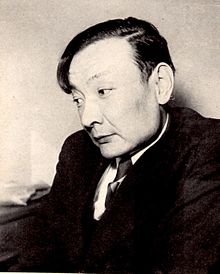Ken'ichi Yoshida (literary scholar)
Ken'ichi Yoshida | |
|---|---|
 Ken'ichi Yoshida in 1951 | |
| Native name | 吉田 健一 |
| Born | 1 April 1912 Tokyo, Japan |
| Died | 3 August 1977 (aged 65) Yokohama, Japan |
| Resting place | Kuboyama Reien, Yokohama |
| Occupation | Writer |
| Alma mater | University of Cambridge |
| Genre | Novels, English literature translations |
| Notable awards | Yomiuri Prize (1957 and 1971) Noma Literary Prize (1970) |
| Parents | Shigeru Yoshida (father) Yukiko Makino (mother) |
| Relatives | Tarō Asō (nephew) Princess Tomohito of Mikasa (niece) |
Ken'ichi Yoshida (吉田 健一, Yoshida Ken'ichi, 1 April 1912 – 3 August 1977) was a
Shōwa period
Japan.
Early life
Yoshida was born in
Goldsworthy Dickinson
, but dropped out and went back to Tokyo in February 1931, on Dickinson's advice that in order to devote his life to literature he should live in Japan. During the next few years he studied French at the Athénée Français in Kanda, Tokyo.
Literary career
Yoshida's début as a writer was in 1935 with a translation of
Nakamura Mitsuo and Yamamoto Kenkichi, Yoshida co-founded the literary magazine Hihyō (批評) (literally, "Critique(s)"), which published critiques of modern French and British
authors.
He was drafted into the Imperial Japanese Navy in May 1945 and assigned to the naval infantry brigade at Yokosuka Naval District, but was never posted to combat. In April 1949, he became a part-time lecturer at the Kōkagakuin. He was a professor of literature at Chuo University from April 1963 to March 1969.
Yoshida's output was prolific in the early post-war period, with works ranging from translations of
Asahi Shimbun, in which he introduced English slang, such as “One for the road”, and “Hair of the dog” to the Japanese public.[1] Noted as an eccentric, Yoshida was often at odds with his politician father. On occasion, after an argument which had resulted in the termination of his financial stipend from his father, he would sit outside the International Press Club in Tokyo with an upturned hat and a sign reading “Prime Minister’s son – penniless” in hopes of generating enough embarrassment to his father that his offenses would be forgiven.[1]
Yoshida lived in
Nakamura Mitsuo. He was awarded the Yomiuri Prize in 1957 and 1971 and the Noma Literary Prize
in 1970.
Yoshida died in his home in Tokyo in 1977, shortly after returning from a trip to Europe, at 65; his grave is in the Kuboyama Reien cemetery in Yokohama.
References
- ISBN 1-873410-48-4
Notes
- ^ ISBN 1903350042. page 71, 209
